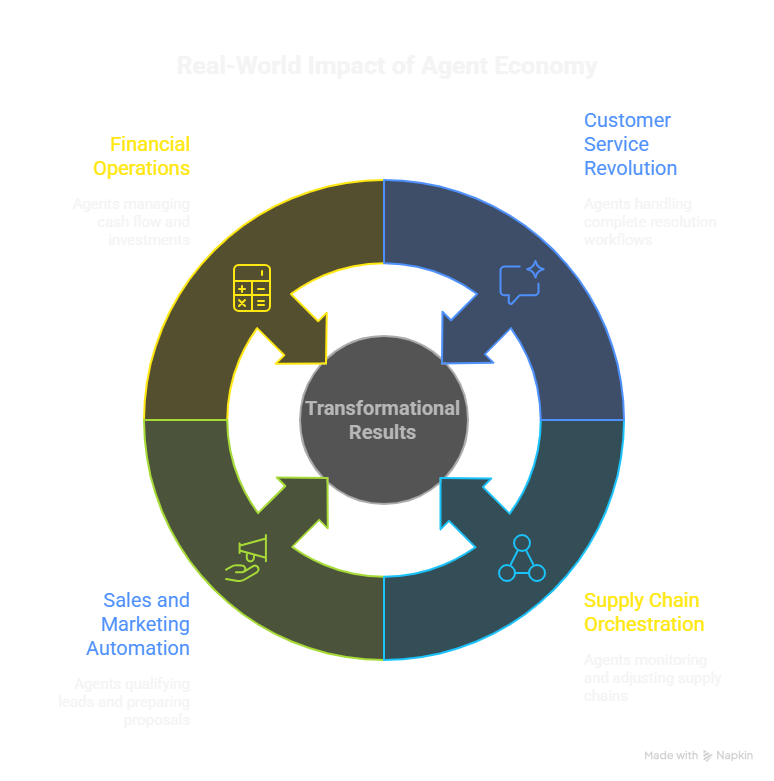How AI Agents Are Leading the Next Business Era
AI agents drive autonomy, faster decisions, and innovation across industries.

The Silent Revolution in Your Industry
While the business world debates the existential implications of artificial intelligence, a quiet revolution is already underway in boardrooms and server rooms worldwide. Companies aren't just implementing AI tools anymore, but they're deploying autonomous AI agents that operate independently, make decisions, and take actions without human intervention.
This isn't the distant future. This is happening right now, and the companies that understand this shift are already building insurmountable competitive advantages.
From Tools to Agents: The Fundamental Shift
To understand why AI agents represent such a seismic change, we need to recognize the fundamental difference between AI tools and AI agents:
AI Tools:
- Respond to human prompts
- Process information on demand
- Require human oversight for every action
- Optimize individual tasks
AI Agents:
- Operate continuously and autonomously
- Proactively monitor and respond to conditions
- Make independent decisions within defined parameters
- Orchestrate complex, multi-step workflows
This distinction might seem subtle, but its implications are revolutionary. We're transitioning from a world where humans utilize AI to augment their capabilities to one where AI systems collaborate with humans as autonomous colleagues.

The Architecture of Autonomous Operations
Modern AI agents operate on three fundamental pillars that make true business autonomy possible:
1. Perception and Monitoring
AI agents continuously monitor their environment, whether that's customer service queues, supply chain metrics, market conditions, or system performance indicators. Unlike traditional monitoring tools that simply alert humans to problems, agents actively assess situations and determine appropriate responses.
2. Decision-Making and Planning
When agents detect conditions that require action, they don't just flag the issue they analyze the situation, consider multiple response options, evaluate potential outcomes, and choose the most appropriate course of action based on predefined business objectives and learned patterns.
3. Action and Orchestration
Perhaps most importantly, agents can execute their decisions by interfacing with existing business systems, updating databases, triggering workflows, communicating with customers, adjusting resource allocation, or coordinating with other agents to achieve complex objectives.
Real-World Impact: The Agent Economy in Action
The transition to agent-driven operations isn't theoretical. Leading organizations are already seeing transformational results:
Customer Service Revolution
Instead of traditional chatbots that can answer basic questions, customer service agents now handle complete resolution workflows. They analyze customer history, identify the root cause of issues, coordinate with multiple backend systems, process refunds or exchanges, update account information, and follow up to ensure satisfaction of all without human intervention for routine cases.
Supply Chain Orchestration
Supply chain agents monitor thousands of variables simultaneously, including weather patterns, shipping delays, inventory levels, demand forecasts, supplier capacity, and geopolitical events. When they detect potential disruptions, they automatically adjust orders, reroute shipments, communicate with suppliers, and update stakeholders before problems impact operations.
Sales and Marketing Automation
Sales agents qualify leads by analyzing behavioral data, industry trends, and company information. They schedule meetings with qualified prospects, prepare personalized proposals based on specific needs, follow up on communications, and even negotiate basic contract terms within predefined parameters.
Financial Operations
Financial agents monitor cash flow, analyze spending patterns, optimize resource allocation, manage vendor payments, and even make investment decisions within risk parameters. They can detect anomalies, prevent fraud, ensure compliance, and optimize financial performance continuously.

The Infrastructure Behind Agent Success
The emergence of platforms like AWS Bedrock AgentCore represents the maturation of agent infrastructure. These platforms provide the foundational capabilities that make enterprise-grade agent deployment feasible:
Model Integration: Seamless access to multiple AI models optimized for different tasks
Security and Compliance: Enterprise-grade security controls and audit trails. System Integration: Native connectivity to existing business systems and databases
Scalability: Ability to deploy and manage thousands of agents across an organization
.Monitoring and Governance: Real-time visibility into agent performance and decision-making
This infrastructure layer is crucial because it transforms agent deployment from a complex technical project to a strategic business initiative.
The Competitive Advantage of Speed
The most significant advantage of agent-driven operations isn't just efficiency but also speed of response. In traditional human-driven processes, there are natural delays between problem identification, decision-making, and action execution. Agents collapse these delays to near-zero.
Consider a supply chain disruption:
Traditional Response (Hours to Days):
- The monitoring system alerts the human operator
- Human analyzes the situation and impact
- Human coordinates with multiple stakeholders
- Human develops a response plan
- Human implements changes across systems
- Human communicates updates to affected parties
Agent Response (Minutes):
- Agent detects disruption in real-time
- The agent analyzes the impact and determines the optimal response
- Agent automatically implements changes across systems
- The agent coordinates with other agents and notifies stakeholders
- Agent continues monitoring and adjusting as needed
This speed advantage compounds over time, creating organizations that can adapt and respond to market conditions faster than humanly possible.
The Skills Revolution: From Task Workers to Agent Orchestrators
The rise of AI agents doesn't eliminate human roles, and it transforms them. The most valuable employees in the Agent Economy won't be those who can perform individual tasks most efficiently, but those who can design, deploy, and orchestrate agent networks most effectively.
New high-value skills include:
Agent Design: Understanding how to decompose business processes into agent-manageable tasks
System Architecture: Designing agent networks that work together effectively
Performance Optimization: Monitoring and improving agent performance over time
Risk Management: Defining appropriate boundaries and fail-safes for autonomous operations
Human-Agent Collaboration: Designing workflows where humans and agents complement each other
Training and Change Management: Helping organizations adapt to agent-augmented operations
Overcoming Implementation Challenges
Despite the compelling advantages, deploying AI agents at scale presents significant challenges that organizations must address:
Trust and Control
Many organizations struggle with the concept of autonomous decision-making. Building trust requires transparent agent behavior, clear audit trails, and robust governance frameworks that ensure agents operate within acceptable parameters.
Integration Complexity
Agents are only as effective as their ability to interact with existing systems. Legacy infrastructure, data quality issues, and system integration challenges can significantly impact agent effectiveness.
Change Management
Moving from human-driven to agent-augmented processes requires significant organizational change. Employees need training, processes need redesign, and organizational culture must adapt to human-agent collaboration.
Quality Assurance
Ensuring agent reliability and accuracy requires sophisticated testing, monitoring, and feedback mechanisms. Organizations need new approaches to quality assurance that account for autonomous decision-making.
The Future of Business Operations
As AI agents become more sophisticated and accessible, we're heading toward a future where the most successful organizations will be those that can most effectively combine human creativity and strategic thinking with agent speed and scale.
Key trends shaping this future:
Proactive Operations: Instead of reactive problem-solving, agents will predict and prevent issues before they occur.
Personalization at Scale: Agents will deliver individualized experiences to millions of customers simultaneously.
Continuous Optimization: Business processes will continuously adapt and improve without human intervention.
Real-time Strategy Execution: Strategic decisions will be implemented across organizations in minutes rather than months
Taking Action: Your Agent Strategy
The question facing business leaders isn't whether AI agents will transform their industry but whether they'll lead that transformation or be disrupted by it.
Critical steps for getting started:
- Identify Agent Opportunities: Analyze your operations to identify processes that could benefit from continuous monitoring, rapid decision-making, and autonomous action
- Assess Infrastructure Readiness: Evaluate your current systems' ability to support agent integration and identify necessary upgrades
- Build Internal Capabilities: Develop or acquire the skills necessary for agent design, deployment, and management
- Start with Pilots: Begin with low-risk, high-value use cases that demonstrate agent capabilities and build organizational confidence
- Scale Strategically: Expand successful agent implementations while building the governance and infrastructure necessary for organization-wide deployment
Conclusion: The Agent Advantage
The Agent Economy represents more than just another technological advancement, and it's a fundamental shift in how business gets done. Organizations that embrace this shift will operate with unprecedented speed, efficiency, and adaptability. Those that don't will find themselves competing at a severe disadvantage against rivals that never sleep, never make emotional decisions, and continuously optimize their performance.
Agentic AI represents a new era of intelligent automation where autonomous agents independently perform complex tasks, driving efficiency and innovation across industries. These AI agents continuously learn and adapt, enabling businesses to operate faster and smarter.
The infrastructure, tools, and knowledge necessary to deploy AI agents are available today. The question is: Will you use them to transform your organization, or will you wait for your competitors to transform yours?
The Agent Economy is here. The only question is whether you'll be leading it or trying to catch up.

FAQ'S
- What is the difference between AI tools and AI agents?
Answer: AI tools require human prompts and oversight, while AI agents operate autonomously, making independent decisions and coordinating workflows without human intervention.
- How do AI agents improve business operations?
Answer: AI agents continuously monitor environments, analyze conditions, make decisions, and take action faster than humans, boosting efficiency and responsiveness.
- What industries can benefit the most from AI agents?
Answer: Industries such as customer service, supply chain management, finance, sales, marketing, and cybersecurity experience significant improvements through the deployment of AI agents.
- What challenges do companies face when implementing AI agents?
Answer: Challenges include building trust in autonomous decision-making, integrating with legacy systems, managing organizational change, and ensuring quality and governance.

